The Government announced New Zealand history will be a compulsory subject in schools by 2022. Annabel McCarthy* takes a look at some campaigns that called for the change.
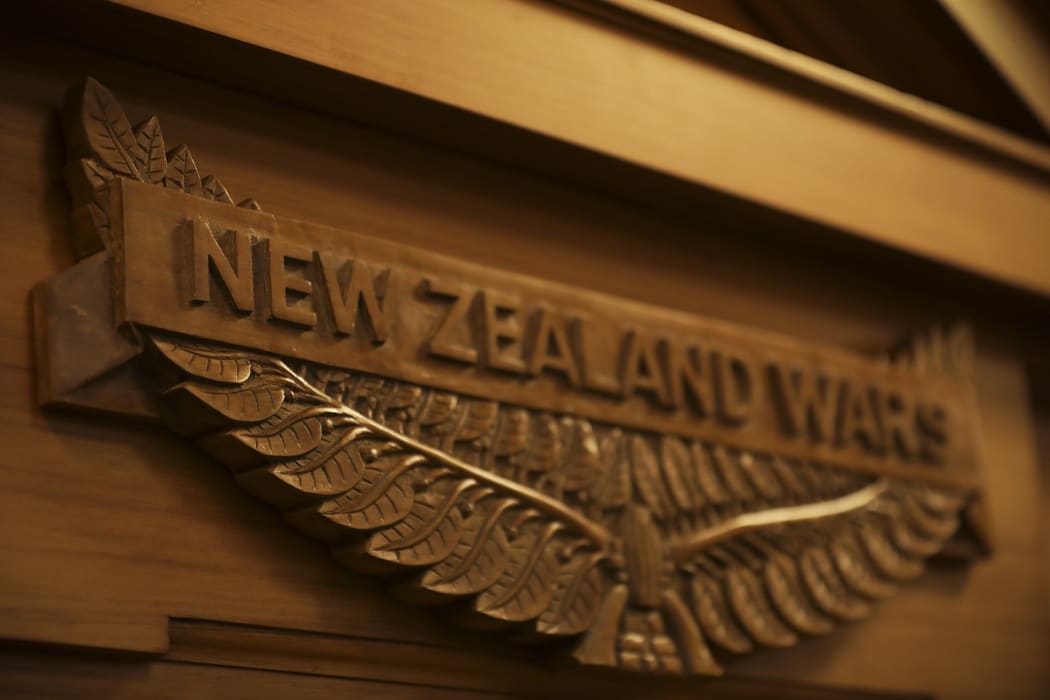
A plaque unveiled in Parliament, commemorating the New Zealand Wars. Photo: RNZ / Ana Tovey
After years of petitions and protests, students and teachers campaigning for New Zealand history to be compulsory have won their fight.
Prime Minister Jacinda Ardern announced this month that New Zealand history will be taught in all primary and secondary schools by 2022.
The current curriculum framework does not dictate when or how an issue will be taught and allows schools and kura to design their own learning programmes.
Advocates for reform say the result is huge disparities in who teaches New Zealand history and how it is taught.
“Kids will tell me that the Māori are dole-bludgers or treaty settlements are just because Māori want more money,” said Youth MP Christian Dennison.
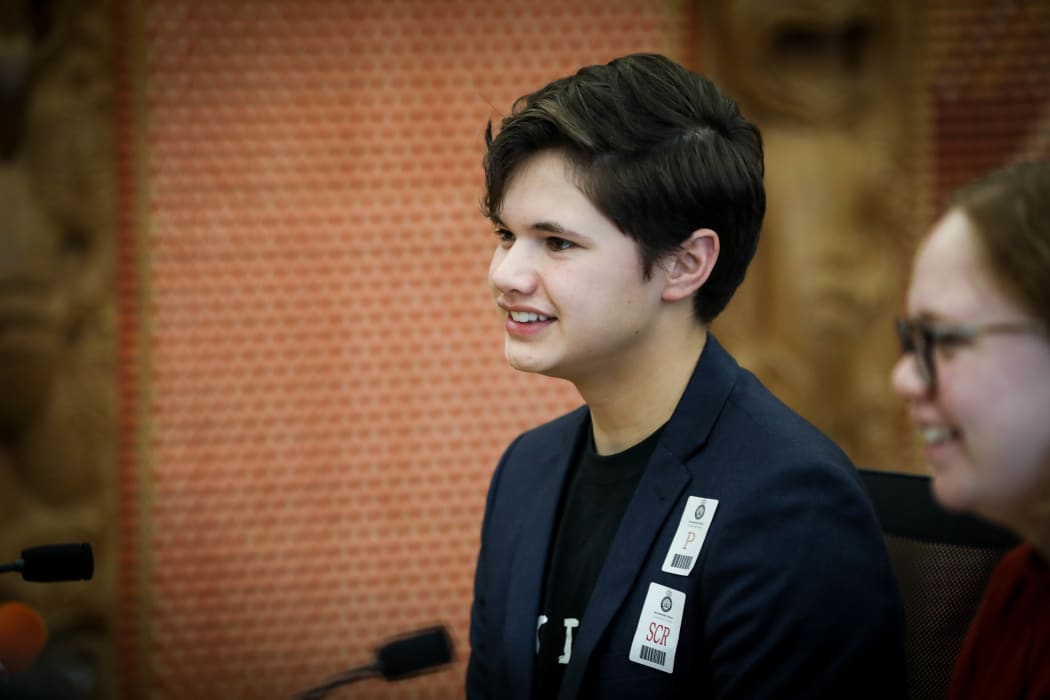
Youth MP Christian Dennison presents a report to the Maori Affairs Committee on behalf of the Youth Parliament Maori Affairs Committee. Photo: VNP / Daniela Maoate-Cox
Dennison was a member of the Youth Parliament’s Māori Affairs select committee which challenged the Government to introduce compulsory teaching of “accurate domestic” New Zealand history in schools and kura for Year 9 and 10 students in July this year.
“A lot of racism comes from ignorance, and ignorance comes from mis-education or lack of education and so we found if we incorporated into the curriculum Māori history, we would be able to get rid of a lot of these false past narratives.”
Chair of the Youth Committee Cha’nel Kaa-Luke told MPs on the actual Māori Affairs Committee that “it's not just making Māori youth more aware of our own history and culture, it's also about making other people aware as well – our non-Māori population. It’s about making sure there’s no discrimination, and that we’re all equal and treated the same.”
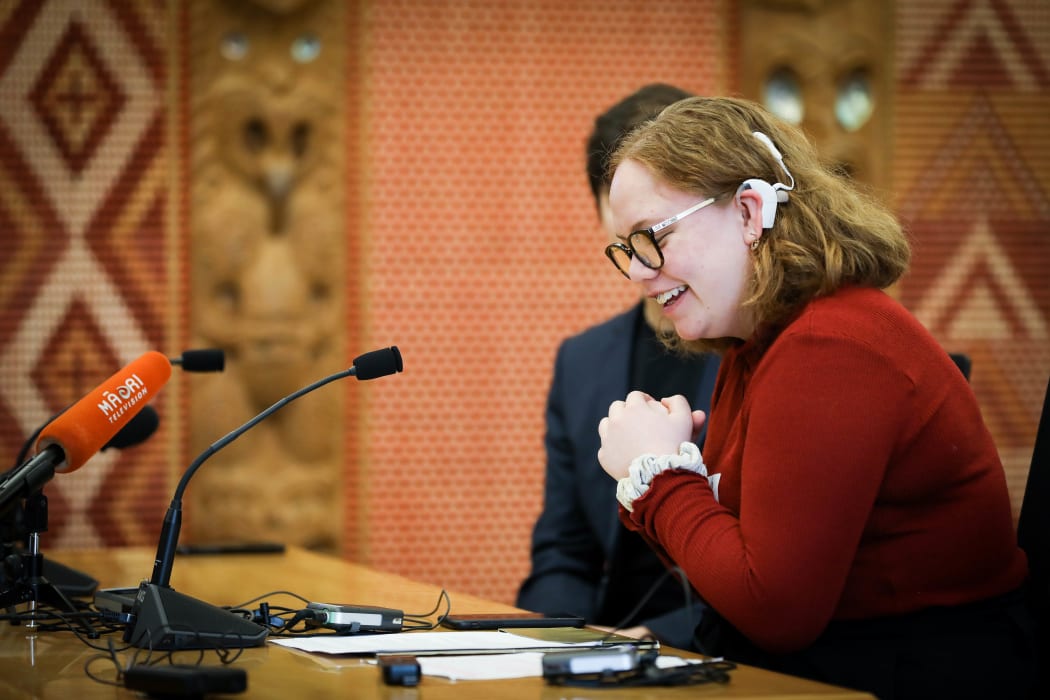
Youth MP Cha'nel Kaa-Luke presents to the Maori Affairs Committee on behalf of the Youth Parliament Maori Affairs Committee. Photo: VNP / Daniela Maoate-Cox
The New Zealand History Teachers’ Association has taken the issue to Parliament twice in the last 16 months.
In June 2018, it briefed the Maori Affairs Committee on on the teaching of New Zealand’s colonial history in schools.
At that briefing chair of the Association Graeme Ball said it was unclear how much of New Zealand's history is being taught in classrooms.
"Whether we're born here or whether we're new New Zealanders coming to New Zealand, it's important that we have an understanding of our shared past," he told the committee.
"Because there are many wise words by people throughout the ages who have talked of the value of knowing one's own history but there's no certainty that any of that is being taught, or taught well, in our schools."
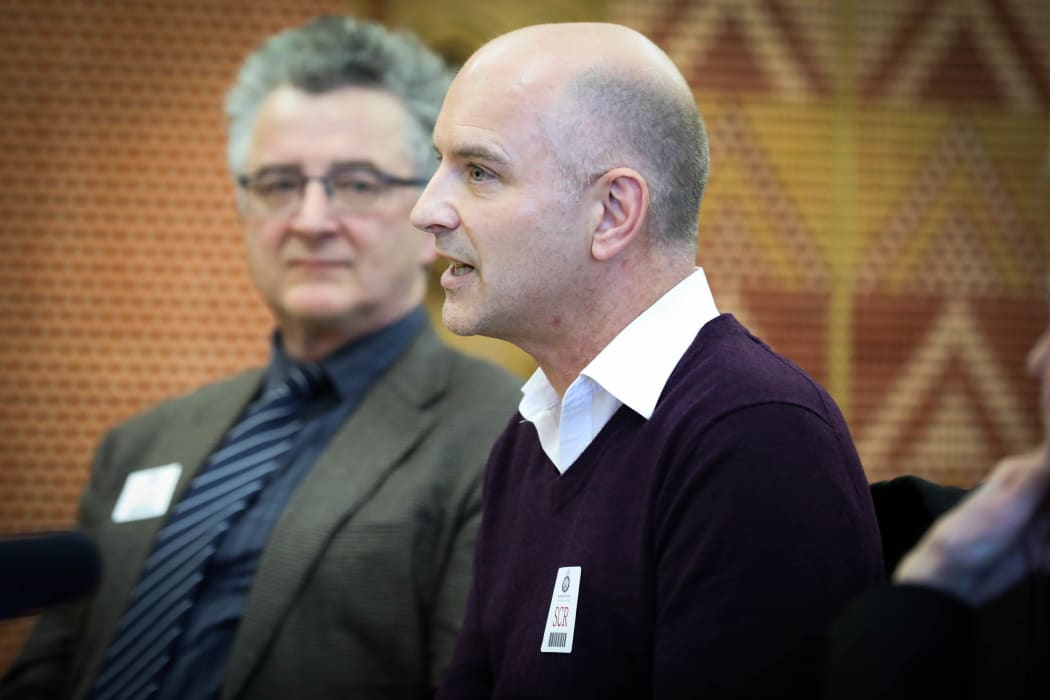
Chair of the New Zealand History Teachers' Association Graeme Ball speaking to the Māori Affairs Select Committee in 2018 Photo: VNP / Phil Smith
He also said the independence teachers have had to create their curriculum allows innovative programmes but New Zealand’s own past has been a victim of this autonomy.
"One of the key reasons for that is that there's no compulsion to teach history at all" he said.
"After social studies which is more general, it's not just history...at the end of year 10 history becomes an option and in many schools they still have many compulsory subjects so the number of options that they have in their time tables is quite limited, in our school it's two."
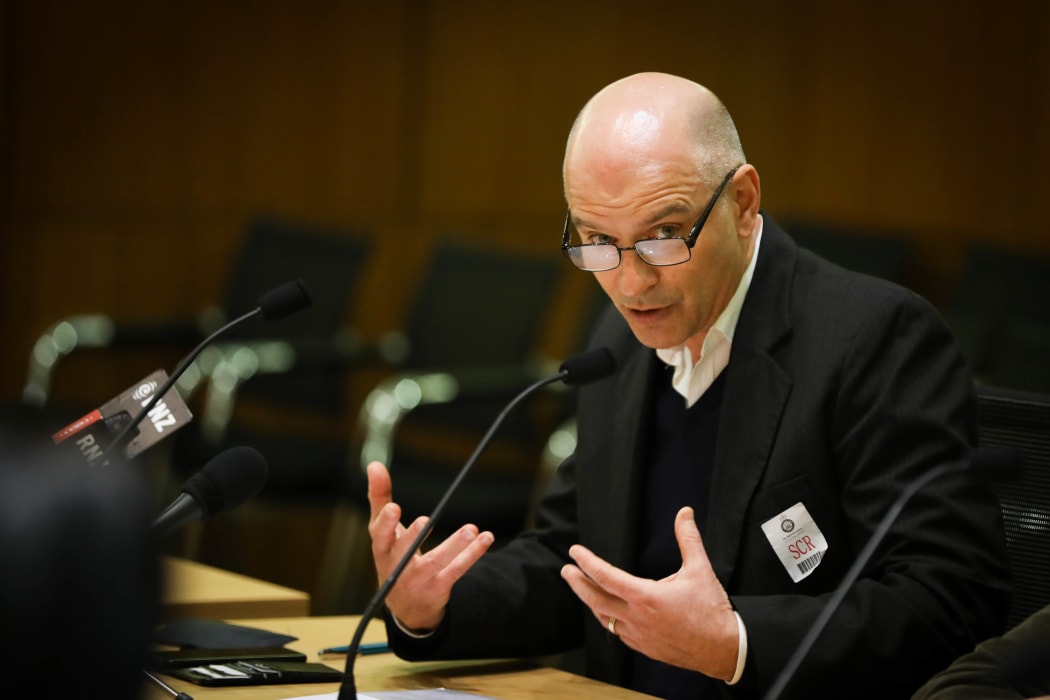
Chair of the New Zealand History Association Graeme Ball speaks to the Education and Workforce Committee in 2019 Photo: VNP / Daniela Maoate-Cox
In June this year the Association's petition calling for the coherent teaching in schools of New Zealand’s shared past was presented to the House of Representatives.
“I want that opportunity for all New Zealanders to be able to make informed judgements about what’s going on today, where it has roots it's in the past,” Ball told the Education and Workforce Select Committee.
However, it’s not the first time Parliament has been pushed on this issue. Young people have been at the forefront of numerous calls for compulsion in recent years.
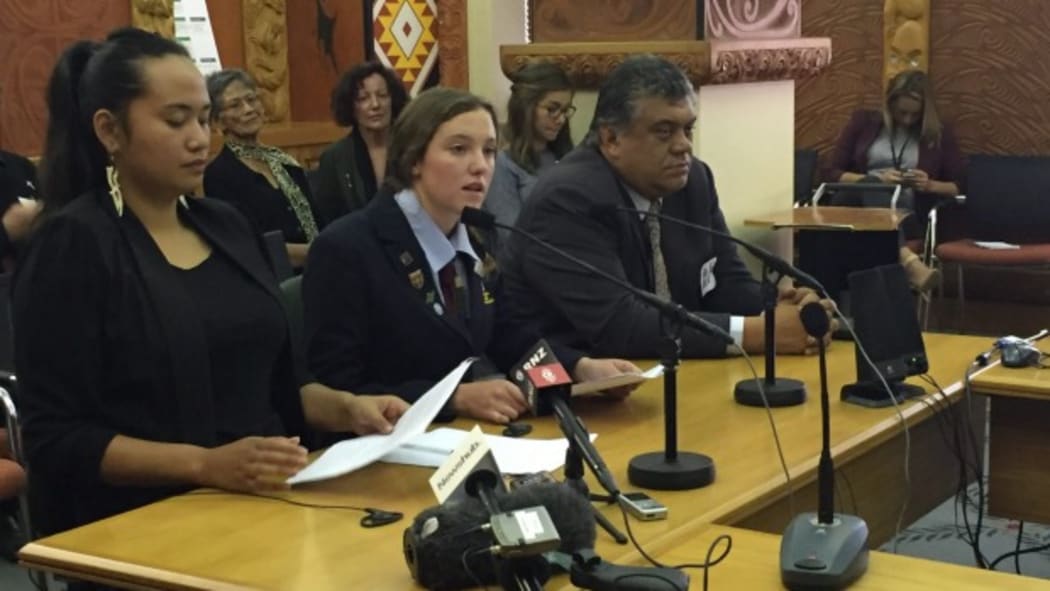
Waimarama Anderson and Leah Bell present their submission alongside Rahui Papa Photo: Supplied
In 2015, two Ōtorohanga College students, Leah Bell and Waimarama Anderson, petitioned Parliament for a national day of commemoration for the New Zealand Wars. In their petition, they suggested the New Zealand Wars ought to be compulsory teaching.
Their campaign garnered considerable attention at the time but failed to make an impact past the select committee hearing. Of 189 submissions made to the Māori Affairs select committee on the petition, almost three-quarters opposed the compulsory teaching suggestions.
The Ministry’s response
In response to the 2015 petition the Ministry of Education said compulsion would likely result in “significant, negative systematic consequences for the schooling sector.”
In response to the Youth Māori Affairs Committee briefing this year the Ministry of Education said “inclusion of Māori histories is essential so that Māori students can see their culture and heritage acknowledged and affirmed in their education.”
But it also said there are factors to consider like a lack of confidence and knowledge among teachers, prioritising of certain aspects of local history over others (eg European history over Māori history), and a leaning towards global events like World War One and World War Two.
NZ History made compulsory
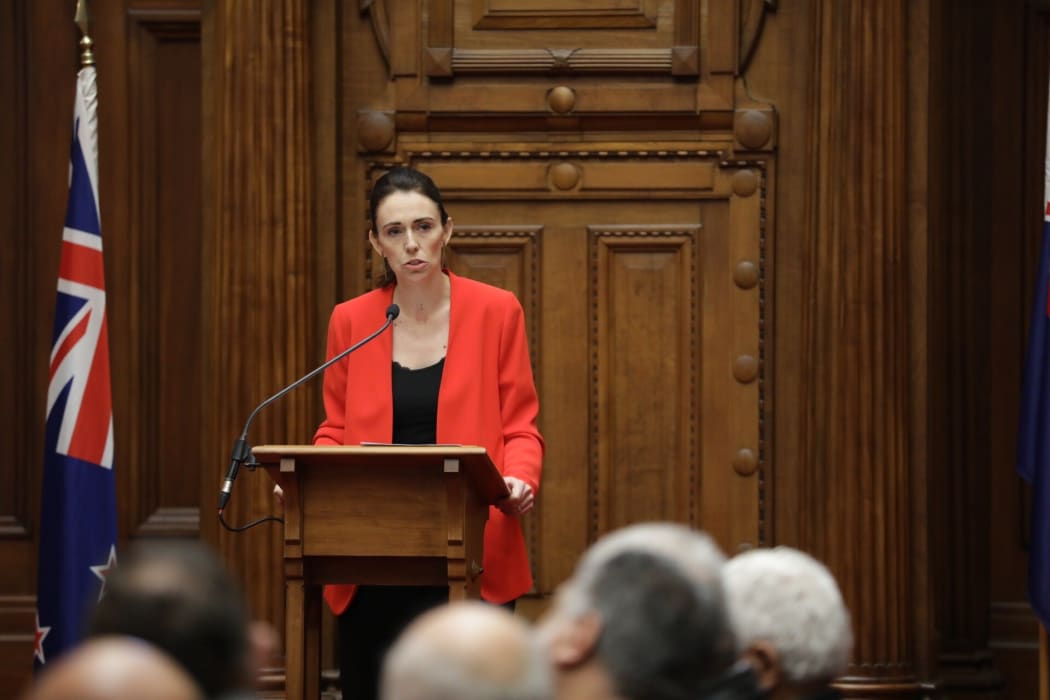
Prime Minister Jacinda Ardern announced that NZ history will be compulsory in all schools by 2022. Photo: RNZ/Ana Tovey
When making the announcement Prime Minister Jacinda Ardern said the government had “listened carefully to the growing calls from New Zealanders to know more about our own history and identity,” but advocates are frustrated it’s taken up until now for governments to address the issue.
The reset is expected to include:
-
The arrival of Māori to Aotearoa New Zealand,
-
First encounters and early colonial history of Aotearoa New Zealand,
-
Te Tiriti o Waitangi / Treaty of Waitangi and its history,
-
Colonisation of, and immigration to, Aotearoa New Zealand, including the New Zealand Wars,
-
The evolving national identity in the late 19th and early 20th Centuries,
-
Aotearoa New Zealand's role in the Pacific,
-
Aotearoa New Zealand in the late 20th century and the evolution of a national identity with cultural plurality.
What the advocates say
"We're the only country [in the OECD] that doesn't teach its own history. What's been squeezing it out all this time?" Graeme Ball told RNZ.
“This should've happened long ago, and I am glad the government has finally come to its senses and made the sensible change,” said Dennison.
Youth MPs said they’ve listened to countless excuses from government representatives to avoid teaching New Zealand history, so they’re pleased the government has finally made the right decision.
“There’s not any excuse valid enough to not teach New Zealand history in schools,” said Dennison.
“I hope that this is going to be a comprehensive and well thought out change to our education system for the betterment of Aotearoa instead of just a quick fix to make it seem like the government is doing good for race relations.”
Youth MP Jordan Lapish said knowledge of the past “has the potential to create greater unity in our society - especially in terms of Māori-Pākehā relations.”
“When people don't understand how things have progressed over New Zealand's history, they can't understand or address current issues. Ensuring a firm foundation of knowledge around our history means that we can look into the future with optimism, and hopefully avoid past mistakes.”
Watch petitioner Leah Bell talk with the Speaker Trevor Mallard about the new plaque to commemorate The New Zealand Wars in the Debating Chamber.
As part of the announcement, Minister of Education Chris Hipkins said the Ministry would work with iwi and mana whenua when developing the new curriculum, a move heavily supported by the Youth Māori Affairs committee.
“The institutional knowledge held by these experts is often unparalleled,” the committee stated in its original report.
“[The year] 2022 is a great goal, but it would mean we would need to best utilize our local iwi, hapū, tangata whenua and sources that we have if it was to be what we are expecting,” said Cha’nel Kaa-Luke.
Youth MPs also hope the importance of localised teaching is not forgotten under the new framework. A strength of the current curriculum is that it allows schools to design content based on local knowledge and needs.
“I'm really hoping that the way this policy pans out allows for history teaching to be localised, incorporating mana whenua,” said Lapish.
“This would mean that students will grow up with a stronger sense of belonging and respect for the whenua they live on, aware of its history, and as such, their history.”
Lapish suggested this include the history of local place names, local hapū and iwi, and early immigration in the area.
He said he’s confident the curriculum announcement will strengthen New Zealand’s education system and advance equity between Māori and Pākehā.
“This policy has the potential to unify New Zealanders and give them a stronger sense of identity and belonging in this country,” according to Jordan Lapish.
“Hopefully this new curriculum will show not just New Zealand, but the world who we are,” Kaa-Luke agreed.
*Annabel McCarthy is a member of the Youth Press Gallery which takes the role of independent media reporting on Youth MPs and Youth Parliament 2019. This article was commissioned specifically for The House.

